Results 8,241 to 8,250 of 8531
Thread Information
Users Browsing this Thread
There are currently 26 users browsing this thread. (1 members and 25 guests)
-
02-09-2024, 06:34 PM #8241
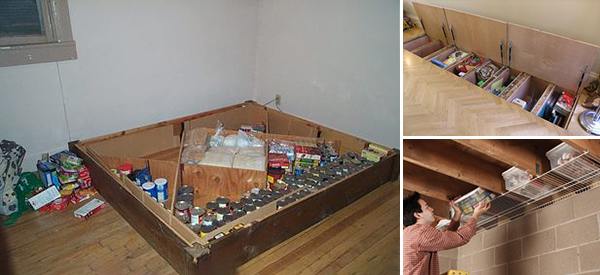
How To Store Six Months of Food When You Only Have Space for One
by TAYLOR ROATCH
November 24, 2017

One of the biggest issues people run into with their preparedness food storage is a lack of space. They simply don’t have enough room to keep all the food that they’ll need in the event of an emergency, leaving them feeling underprepared.
Space may seem like one of the biggest barriers to your food storage goals, but it doesn’t necessarily have to be. Whether you live in an apartment, a small house, or even a camper, there are plenty of ways you can squeeze in more food storage so that your family can be prepared if worse comes to worst.
Related: My Famine Food Storage Menu
Get Creative with the Space You Have
You may be thinking of your food storage space as a specific, traditional space that you have set aside for food storage, like a pantry or a set of shelves in the garage or basement (though I’m certainly not recommending you store foods in those places unless they’re appropriately critter proofed and climate controlled!). If you want to get serious about your food storage on a small foot-print, you might first consider thinking outside of the box a little when it comes to where you’ll store food. Here are some ideas you may not have considered for fitting in more food storage.
- Add custom shelving to areas under stairs to provide an extra space to store food.
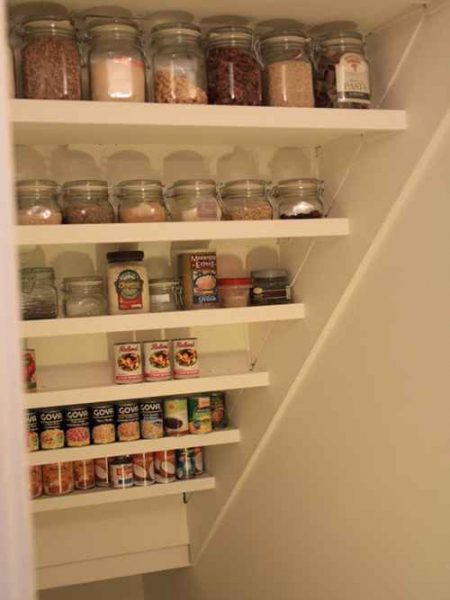
- Use unusable cupboard space more effectively. We oftentimes forget about those tough-to-reach spaces like on top of the cabinets and awkward or high-up cupboards. They wind up filled with junk-drawer-esque materials because you can’t really access them easily anyways, but they’re perfect for emergency food storage.
- Upper closet shelves are often under-utilized spaces.
- Store food under beds, and lift them up if there’s not much room between the bottom of the bed and the floor.
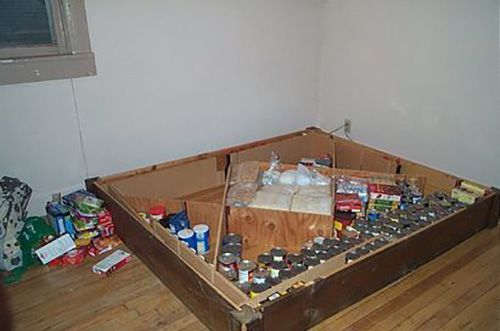
- Never ignore space inside of storage items, like baskets or luggage. Since you’re already storing those items, go ahead and stick some food storage in them.
- Create ‘furniture’ from stored food items. Instead of traditional end or bedside tables, switch it up with a stack of canned goods topped with a piece of wood cut to size. Toss a table cloth over it and no one will ever know the difference.
- Utility room space is great for food storage, as well, so long as your food storage isn’t creating any hazards with the appliances and house implements contained within.
- Use organizing items like over-the-door racks and cutesy basket racks to up your food storage space.
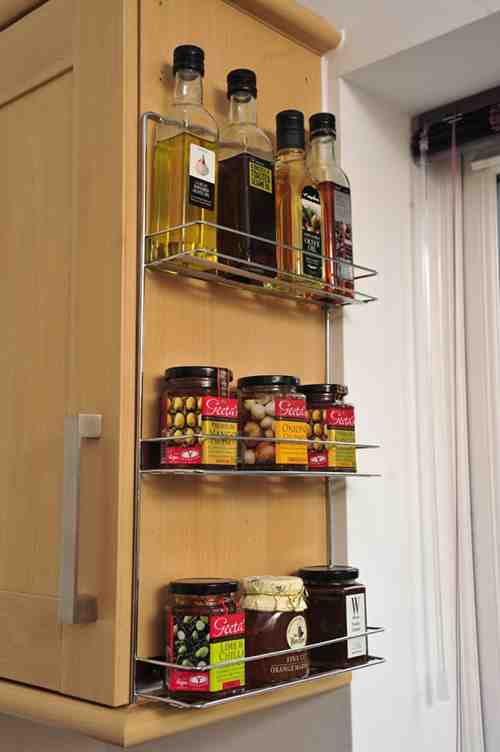
- Add shelves in cabinets so that they’re better laid out for your personal food storage. This is one time that cabinets with adjustable shelves are a life-saver!
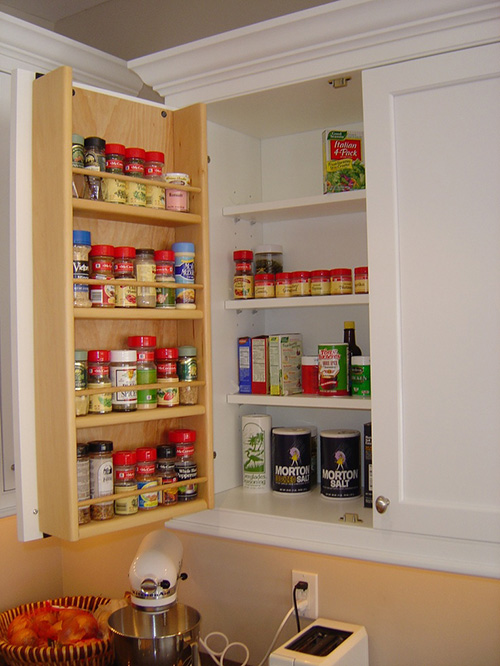
- Store water in an unused bathtub or shower. Water storage can take up A LOT of space, but it’s absolutely necessary that you have adequate water storage for your family. Use these water-proof spaces or invest in some water storage cubes that stack neatly so that it doesn’t take up more space than it must.
Related: 23 Things a Prepper Should Never Throw Away. Why?
Opt for Bulk Goods that Fit in Your Spaces
We tend to get tied down by the spaces we have to work with, so make sure you’re using them to their best advantage. While larger containers generally take up less space for the same amount of food, you’ll want to fill in spaces with smaller items.
It’s easier to fit in more food if it’s all packaged the same. Whenever possible, purchase or store food in the same size containers to make the best of limited space.
Also, be sure you’re stacking items to their benefit. Mix and match different sized and shaped goods in stacks on your pantry shelves so that you utilize as much of your available space as possible top to bottom, as well. Put items that don’t stack well into boxes so that they do, allowing you to utilize more space.
Related: 10 Long Shelf-Life Canned Foods Every Prepper Should Consider Stockpiling
Use Flexible, Non-Wasteful Storage Methods
Bags are a great way to be able to pack a little more in to a small space. Mylar bags with oxygen absorbers can be squeezed in to small spaces much easier than gigantic buckets or even #10 cans.
Another way to save some space is to pack items in vacuum sealed bags. Oftentimes, you’re paying (in space, of course) just for the way something is packed at the super-market. Vacuum bags mean that you’re not wasting space to store air.
Utilize Wall Space
Just because there’s no room for a full set of shelves on a wall doesn’t mean that it’s not available for food storage. Build a wall-mounted can organizer to create an extra space for canned goods. This is perfect for walls behind doors that often go ignored for their food storage potential because there’s not much space available.
This is a great way to make sure that your canned goods are appropriately rotated, as well, with the oldest foods being used up first and the newest remaining inaccessible at the top of the organizer.
Opt for Food with a Smaller Footprint
Dehydrated food takes up less space. The water has already been removed, leaving smaller footprint food that can be vacuum packed for optimal storage. Where ever it’s feasible, opt for dehydrated foods over canned goods. You can re-hydrate many foods later on if necessary.
Another way to aim for a smaller food footprint is to invest in small foods that pack a big caloric and nutritious punch. While a balanced diet is important, focusing on higher calorie foods, like whey protein, avocado powder, dried fruit, seeds, nuts, and quinoa to fill up a very limited space equals more energy that may be hard to come by for a long time after a disaster to fuel you up.
Make Sure to Store Food Properly, Even when You’re Storing Small
Even if you’re working with a small space, it’s important that you adhere to the regular rules of food storage. Make sure you keep your stores safe from weather changes and pests, and be sure that you rotate food storage so that you’re using older foods in your everyday diet and replacing them with new versions. This helps avoid food (and money!) waste.
You may also like:
14 Must-Have Canned Foods You Didn’t Know Existed
How To Make Your House Invisible To Looters (video)
Debunking Expiration Dates: What You Need to Know
50 Low-priced Items That Will be Invaluable when SHTF
When Grocery Stores Go Empty… A Back Door Shopping Strategy
How To Store Six Months of Food When You Only Have Space for One - Ask a PrepperIf you're gonna fight, fight like you're the third monkey on the ramp to Noah's Ark... and brother its starting to rain. Join our efforts to Secure America's Borders and End Illegal Immigration by Joining ALIPAC's E-Mail Alerts network (CLICK HERE)
- Add custom shelving to areas under stairs to provide an extra space to store food.
-
02-09-2024, 09:24 PM #8242


UPDATED 10 FEBRUARY, 2024 - 00:00 ANCIENT-ORIGINS
How Living Like a Hunter-gatherer Could Improve Your Health
By Nicholas Bourne/The Conversation
Many of us want to live long, happy and healthy lives. Yet it’s often confusing to know the best way to achieve this, and many aspects of modern, westernized living conspire to keep us from achieving this goal. The solution may be to step back in time. For the bulk of our existence, we evolved following a hunter-gatherer lifestyle of foraging for food and hunting animals. Today, only a few hunter-gatherer communities still exist, such as the Hadza of Tanzania.
Research shows that many of the health problems that plague modern society, such as cardiovascular disease and poor mental health, have very low prevalence among hunter-gatherer societies of both past and present day. This suggests there’s much we can learn from hunter-gatherers to improve our lives.
- Unique Iberian Male DNA was Practically Wiped Out by Immigrant Farmers 4500 Years Ago
- Three Ancient Diets That Are Still Popular Today
Building connections
Hunter-gatherers knew the best strategy for survival was connecting and staying together.
With finite resources, they are egalitarian by nature. Each member contributes, shares equally and belongs to a collective greater than themselves. Life has meaning and purpose.
According to James Woodburn, an anthropologist who studied the Hadza, tribe members “value their life as hunter-gatherers, they regard it as a wonderful life. They have a living which makes sense.”
The Japanese call this fundamental reason for being “ikigai”, which can add quality years to your life. Living in small communities of around 20-30 people creates close relationships and a strong social support network.
Close meaningful relationships are key drivers of health and happiness across our lifespan. In fact, our brains are so wired to connect that our wellbeing depends on it.
Many aspects of modern society, such as urbanization, the nuclear family and consumerism, mean many of the connections inherent to hunter-gatherer society have been eroded.
But there are many evidence-based ways to reconnect with hunter-gatherer ethos and improve mental wellbeing.
Examples include reconnecting with people and your community (such as through volunteering) or getting involved in a cooperative. The NHS [UK] has even introduced a long-term social prescribing strategy, which helps people get involved with these kinds of initiatives and connect with those in their community.
Exercising in green spaces and practicing are also great ways of connecting with the present and boosting mental health.
- Pre-Stonehenge Landscape Was Perfect for Hunter-Gatherers, Study Shows
- Charting the Role of Prehistoric Genius in Technological Revolution
Eating well
Hunter-gatherers eat what nature and the land offer. This at times can be scarce, requiring periods of fasting. Diets primarily consist of plant-based foods, such as tubers, berries and fruit that are readily available.
Many studies have shown that plant-based diets and fasting can have many benefits for health.
For example, research on people living in so-called “blue zones” – geographic areas that have unusually high life expectancies – suggests their predominantly plant-based diets may contribute to their long lifespans.
Intermittent fasting helps to reduce calorie intake and can lower the risk of cardiovascular disease and type 2 diabetes by increasing metabolic flexibility – our ability to effectively use both carbs and fat for energy.
Because hunter-gatherers eat what nature offers, this means their diets consist mainly of whole foods. Yet in the UK and US, ultra-processed foods (such as ready-made meals) now make up a large proportion of people’s daily calorie intake.
These foods typically contain lots of sugar, salt, saturated fat and artificial additives. Research has linked these foods with a range of health problems, including obesity and cancer.Limiting intake of ultra-processed foods and adopting a diet more akin to those followed by hunter-gatherers can help improve your health.
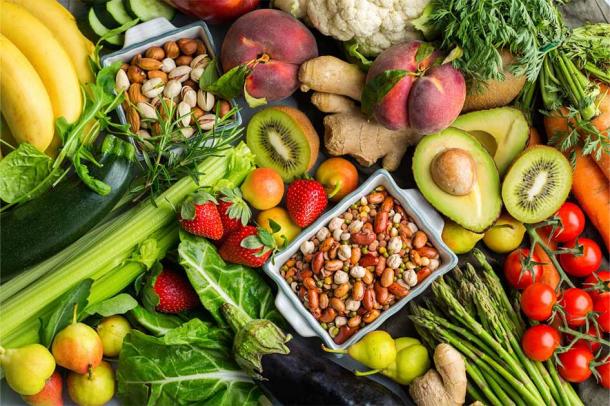
Fresh, non-processed foods are better for your health. (aamulya/Adobe Stock)
Moving more
Hunter-gatherers evolved to move. Their nomadic lifestyle of hunting and foraging meant they consistently covered distances from six to 16km daily.
But modern lifestyles are far more sedentary. Combined with diets high in ultra-processed foods, this means many of us consume more calories each day than we use, leading to weight gain.
To address this imbalance, we need to move more – and move how hunter-gatherers do.
It’s recommended adults get at least 150-300 minutes of moderate-intensity activity (such as brisk walking) or at least 75-150 minutes of vigorous physical activity (such as running or dancing) per week. While this isn’t quite as much movement as hunter-gatherers would get daily, it will still improve cardiorespiratory fitness and muscle strength, which is important for better health and longer lifespan.
Being active regularly doesn’t necessarily mean you have to go to the gym. Walking to the shops, climbing stairs and cleaning can all have a positive effect on your cardiovascular health and longevity.But if you really want to mimic hunter-gatherers’ activity more closely, you might consider trying interval training. This involves alternating periods of moderate- or high-intensity physical activity with low-intensity activity – such as sprinting for 30 seconds on the treadmill then jogging for a minute in between to catch your breath. This mimics the vigorous kind of physical activity hunter-gatherers would have done when hunting. Interval training is also beneficial for cardiovascular health.
We can also benefit from moving more like hunter-gatherers. Movements such as squatting and getting up and down from the ground, mimic how they’d move when foraging for food. These functional movements help preserve physical independence and may add years to your life.
While our modern society certainly doesn’t make it easy to live a lifestyle more aligned with how we evolved, that doesn’t mean there aren’t many small, easy changes we can make to be healthier. Making time to socialize, focusing on getting more plants in our diets and moving more often are all things we can do daily to live more like hunter-gatherers – and look after our health.
This article was originally published under the title ‘How living like a hunter-gatherer could improve your health’ by Nicholas Bourne on The Conversation, and has been republished under a Creative Commons License.
Top image: Ancient human foraging for berries and edible plants in a dense forest. Source: Microgen/Adobe Stock
How Living Like a Hunter-gatherer Could Improve Your Health | Ancient Origins (ancient-origins.net)Last edited by Airbornesapper07; 02-09-2024 at 09:27 PM.
If you're gonna fight, fight like you're the third monkey on the ramp to Noah's Ark... and brother its starting to rain. Join our efforts to Secure America's Borders and End Illegal Immigration by Joining ALIPAC's E-Mail Alerts network (CLICK HERE)
-
02-12-2024, 06:58 AM #8243
Ask Jeff Williams
Ask Jeff Williams
@Askjeffwilliams
302K subscribers
582 videos
HOW TO FIND GOLD | Sluice Box - ask Jeff Williams (youtube.com)
 12:02
12:02
NOW PLAYING
Another Lost Waterfall of Gold Found #2 - #askjeffwilliams
20K views
19 hours ago
 14:52
14:52
NOW PLAYING
Sluice Box Gold - Gold Panning #askjeffwilliams
12K views
1 day ago
 27:09
27:09
NOW PLAYING
7 Years Digging a Secret Tunnel #askjeffwilliams
48K views
7 days ago
 14:40
14:40
NOW PLAYING
How To Get Gold from Pyrite (Iron Sulfide) #ask Jeff Williams
19K views
8 days ago
 12:49
12:49
NOW PLAYING
"Find GOLD Faster: Google Earth Prospecting Tips & Tricks"
24K views
2 weeks ago
 14:31
14:31
NOW PLAYING
The Lost Arrastra of Gold: Secret Location Revealed
23K views
2 weeks ago
 25:01
25:01
NOW PLAYING
Geology Secrets to Finding Gold - Tips and Tricks for Success.
23K views
3 weeks ago
 13:12
13:12
NOW PLAYING

We Found the Mother Lode of Placer Gold! New Gold Rush
29K views
3 weeks ago
 20:22
20:22
NOW PLAYING
Arizona's Lost Gold Mines: Revealing the Secrets of Geology 2024
32K views
4 weeks ago
 14:10
14:10
NOW PLAYING
Opening up a High-Grade Gold Ore Lode Mine: Ask Jeff Williams
40K views
4 weeks ago
 15:08
15:08
NOW PLAYING
Using Google Earth to Find Gold, Ghost Towns and Caves.
36K views
1 month ago
 15:41
15:41
NOW PLAYING
GOLD Geology 101: What Rocks Host GOLD Deposits
33K views
1 month agoIf you're gonna fight, fight like you're the third monkey on the ramp to Noah's Ark... and brother its starting to rain. Join our efforts to Secure America's Borders and End Illegal Immigration by Joining ALIPAC's E-Mail Alerts network (CLICK HERE)
-
02-12-2024, 07:00 AM #8244If you're gonna fight, fight like you're the third monkey on the ramp to Noah's Ark... and brother its starting to rain. Join our efforts to Secure America's Borders and End Illegal Immigration by Joining ALIPAC's E-Mail Alerts network (CLICK HERE)
-
02-12-2024, 07:08 AM #8245If you're gonna fight, fight like you're the third monkey on the ramp to Noah's Ark... and brother its starting to rain. Join our efforts to Secure America's Borders and End Illegal Immigration by Joining ALIPAC's E-Mail Alerts network (CLICK HERE)
-
02-13-2024, 12:20 AM #8246
Tai Chi Surpasses Aerobic Exercise For Lowering Blood Pressure
POSTED ONFEBRUARY 12, 2024HEALTH AND WELLNESS
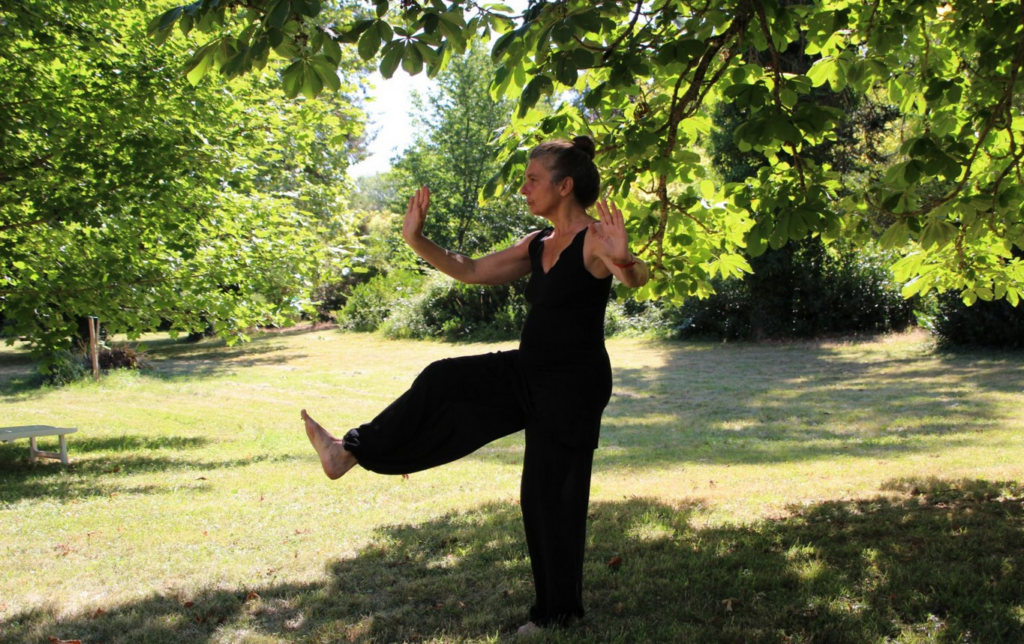 By Study Finds
By Study Finds
Tai Chi is more effective than traditional aerobic exercises for reducing blood pressure in adults with prehypertension, new research suggests. Researchers warn that increases in systolic blood pressure — the top number of a blood pressure reading — signals a higher risk of developing hypertension and cardiovascular diseases.
Prehypertension is a critical health stage, indicating elevated blood pressure levels that are not yet high enough to be classified as hypertension but still pose significant risks for future cardiovascular problems. Recognizing the importance of early intervention, researchers in China compared the impacts of Tai Chi, a gentle form of Chinese martial arts known for its health benefits, against more vigorous aerobic activities such as jogging, brisk walking, and cycling.
Conducted across two major hospitals in China from July 2019 to January 2022, this research involved 342 participants between 18 and 65 years-old, all of whom were at the prehypertension stage, with systolic levels between 120 to 139 mm Hg or diastolic blood pressure (DBP) levels between 80 to 89 mm Hg.
Researchers from the China Academy of Chinese Medical Sciences split the participants into two groups, with one group undertaking Tai Chi and the other engaging in aerobic exercise, including climbing stairs, jogging, brisk walking and cycling four times a week during the same time frame. Both groups participated in four 60-minute supervised sessions weekly for an entire year. The primary measure of success was the reduction in office-measured SBP after 12 months.
Half of the participants, average age 49, engaged in Tai Chi for an hour in four weekly guided sessions over a year.
The Tai Chi group saw a significantly greater reduction in SBP compared to the aerobic exercise group. Specifically, Tai Chi participants experienced a reduction of -7.01 mm Hg in their systolic blood pressure (SBP), whereas those in the aerobic exercise group saw a -4.61 mm Hg reduction. These findings were not isolated to office-measured BP; the Tai Chi group also showed superior results in 24-hour ambulatory SBP measurements, particularly during nighttime, suggesting an enduring and consistent blood pressure management effect.
Why does Tai Chi have this effect?
Tai Chi is a mind-body practice that emphasizes slow, controlled movements, deep breathing, and mental focus. Unlike aerobic exercise, which can require significant space and pose a risk of joint damage, Tai Chi is low-impact, making it accessible for individuals of all ages and fitness levels. It not only helps improve physical balance and cardiopulmonary function but also encourages relaxation, potentially reducing stress levels and thus, blood pressure.
The researchers note that study is a significant addition to the body of evidence supporting the health benefits of Tai Chi, suggesting that it may be particularly beneficial for those in the early stages of hypertension. With its ease of practice and minimal requirements, Tai Chi stands out as a promising strategy for cardiovascular disease prevention, offering a path to better health that is both accessible and enjoyable.
The study is published in JAMA Network Open.
You might also be interested in:
- Tai chi just as effective as regular exercise for older adults trying to reduce belly fat
- Most people clueless about their own blood pressure, cholesterol
- The top food for lowering blood pressure is…
Source: Study Finds
View StudyFinds’s article archive
Tai Chi Surpasses Aerobic Exercise for Lowering Blood Pressure (naturalblaze.com)
If you're gonna fight, fight like you're the third monkey on the ramp to Noah's Ark... and brother its starting to rain. Join our efforts to Secure America's Borders and End Illegal Immigration by Joining ALIPAC's E-Mail Alerts network (CLICK HERE)
-
02-13-2024, 12:29 AM #8247
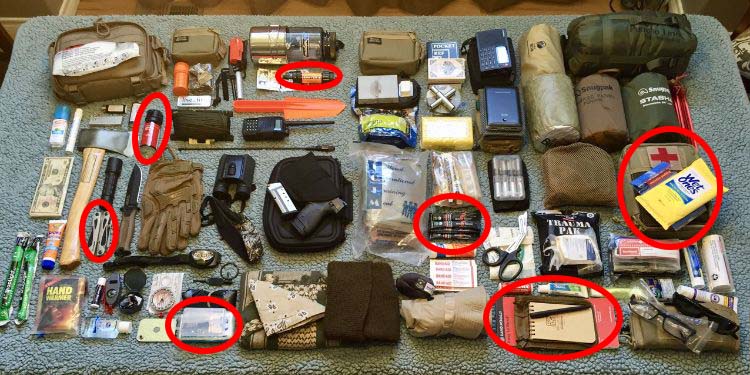
EMP Survival Stockpile: What Are You Still Missing?
by MICHAEL MAJOR
September 8, 2023

The threat of an EMP or CME is always present, and many preppers are taking matters into their own hands to prepare for these events.
The basic building blocks of our EMP survival stockpiles are well known and are the first things we acquire.
When you have all the water, food, backup power, and everything else you think you’ll need, there are probably a few more items you have not considered.
I have compiled a short list of some items that you may be missing from your stockpile.
Hand Operated Tools
We rely on many power tools when building projects around the home. After the grid goes down, there will still be many things that need repairing or building for which you’ll need tools.
Most of us probably have a supply of battery-operated power tools and the backup power to charge those batteries. What happens if the EMP takes out your backup power source or destroys your power tools?
Related: EMP Prevention Plan: Why Our Government Has Done Nothing
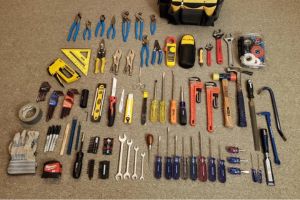
For every power tool, you should try to have a manual equivalent.
There may not be a good manual option for larger tools like table saws, router tables, radial arm saws, or bench grinders. That being said, there are a lot of basic hand tools that you should include in your stockpile.
- Hand saws of various sizes and tooth patterns
- Hand drills and drill bits
- Hand planes
- Hammer and nails
- Screwdrivers
One good way to find out what you might need to add to your preps is to look at all the tools you own that require power and look for a manual equivalent.
EMP Cloth
The EMP Cloth is a specialized material engineered to effectively shield against all forms of electromagnetic waves.
When you wrap any object with it, it provides protection against the destructive impact of an EMP, offering the most straightforward safeguarding solution I’ve encountered for crucial electronic devices.
The EMP Cloth safeguards your electronics from the E1, E2, and E3 waves of an EMP, as well as shielding them from a CME, also known as a solar EMP, which our planet is presently overdue for.
Manual Generators
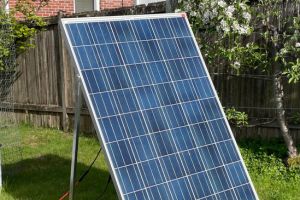 Gas and solar generators are a staple in the preparedness space.
Gas and solar generators are a staple in the preparedness space.
We should all have these items in case the grid fails.
These backup power sources may be disabled by an EMP or CME and unavailable when you need them most.
Many human-powered generators are on the market today that would be a great addition to any EMP kit. These won’t do much to power your home, but they can keep batteries topped up while giving you some exercise.
You can also build wind turbines or water wheels that will offer a source of off-grid power. Often you can make these with easily obtained parts for a low cost. You don’t need to construct the devices now; you can set the components aside in case you need them.
Hard Copies
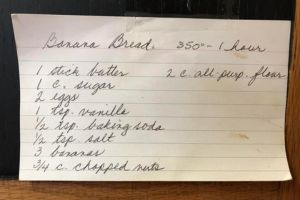 The problem with an online world is that too much important information is trapped on hard drives or the cloud. All your important documents need to have a hard copy or two printed and stored somewhere safe.
The problem with an online world is that too much important information is trapped on hard drives or the cloud. All your important documents need to have a hard copy or two printed and stored somewhere safe.
This should also include things that you may not have thought much about.
Recipes are something that many of us go online for. Gone are the days of cookbooks; we can simply use Google to tell us how to make dinner. Printing all your favorite family recipes is worthwhile so you can continue to cook decent food after the grid fails.
If you want a book filled with recipes for long-lasting survival foods, consider getting The Lost Super Foods. Everything in this book is explained in a clear, precise, step-by-step fashion, accompanied by colored pictures and easy-to-follow instructions.
Contact lists are another thing you should make a hard copy of. An EMP may not mean that the grid is down forever, and having a list of your family contacts will make things a little easier when re-establishing communication.
Passwords and account details are also essential to have a hard copy for when the grid returns online.
Manual Coffee Maker
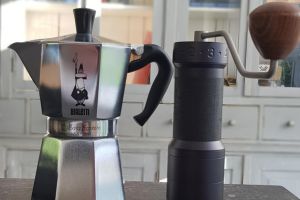 I love my Nespresso and Keurig coffee machines, but they will not be particularly useful when the grid goes down.
I love my Nespresso and Keurig coffee machines, but they will not be particularly useful when the grid goes down.
A way to make a cup of coffee without plugging a machine in will mean that you can still get your morning caffeine fix even during the apocalypse.
Books/Manuals
There are many survival books and other valuable reference books on the market. You should have a library of as many reference books as you can.
Think about what information you would want to use the internet to find after SHTF and pick up a book containing that information. A few examples of the types of books and manuals you should stockpile are:
- First aid and other medical reference books
- DIY books for construction, electrical, and plumbing.
- Books on welding, fabrication, or mechanical trades
- Manuals for all your equipment and appliances
- Repair manuals for vehicles, equipment, and appliances
- Books on primitive skills
- Military field manuals
We should all be preparing for an EMP, but there has not been a case where an EMP has been used on a population that we can learn from.
The best way to get your stockpiles built up enough to keep your family safe and secure after the grid goes down is to take the time now to carefully consider each aspect of it and ask yourself what can be improved or what may be missing.
You may also like:
When The World Runs Out Of Food, This Is All You Need
The 7 Actions To Take Immediately Following An EMP Strike (Video)
What the Government Can or Can’t Do Under Martial Law
What No One Told You About Dumpster Diving
50 Movies That Will Teach You A Lot About Survival
EMP Survival Stockpile: What Are You Still Missing? - Ask a Prepper
If you're gonna fight, fight like you're the third monkey on the ramp to Noah's Ark... and brother its starting to rain. Join our efforts to Secure America's Borders and End Illegal Immigration by Joining ALIPAC's E-Mail Alerts network (CLICK HERE)
-
02-14-2024, 11:48 PM #8248
25 Things That You Should Do To Get Prepared For The Coming Economic Collapse
 Michael Snyder February 14, 2024 0
Michael Snyder February 14, 2024 0
Economic Collapse, Prepping
America, Debt, Debt Bubble, disaster, Economic Problems, Global Banking System, Greatest Debt, Greatest Debt Bubble, Leverage, Preparation, Prepare For The Collapse, Prepared, PREPPER, Preppers, prepping, The United States, What To Do
Do you think that you know how to prepare for the collapse of the economy? If so, are you putting that knowledge into action? In America today, people are more concerned about the possibility of an economic collapse than ever before. It has been estimated that there are now three million preppers in the United States. But the truth that nobody really knows the actual number, because a lot of preppers keep their “prepping” to themselves. So what are all of those people preparing for exactly? Well, survey after survey has shown that “economic collapse” is the number one potential disaster that preppers are most concerned about. Of course that shouldn’t be surprising because we truly are facing economic problems that are absolutely unprecedented. We are living in the greatest debt bubble in the history of the world, the global banking system has been transformed into a high-risk pyramid scheme of debt, risk and leverage that could collapse at any time, and wealthy countries such as the United States have been living way above their means for decades. Meanwhile, the United States is being deindustrialized at a blinding pace and poverty in this country is absolutely exploding. Anyone that is not concerned about the economy should have their head examined. Fortunately, I have found that an increasing number of Americans are becoming convinced that we are heading for a horrific economic crisis. Once they come to that realization, they want to know what they should do.
And the reality is that “getting prepared” is going to look different for each family based on their own unique circumstances. Some people have a lot of resources, while others have very little. Some people are very independent of the system and can move wherever they want, while others are totally dependent on their jobs and must stay near the cities at least for now.When civilisation collapses, he predicts, the world will go back to barter.In addition, it is important to distinguish between the “short-term” and the “long-term” when talking about economic collapse. As I have written about previously, our economic collapse is not going to happen all at once. It is going to unfold over time. In the “short-term”, many are moving money around and are building up “emergency funds” to prepare for the next recession. For the “long-term”, many are storing up food and huge stockpiles of survival supplies in order to be prepared for the total collapse of society. Both approaches are wise, but it is important to keep in mind that different approaches will be needed at different times.
Urges everyone to have a disaster-preparedness kit containing enough food, water and other supplies to last 72 hours. This is sensible advice, and preppers have a point when they mock those who ignore it.
The strategies posted below are a mix of both short-term and long-term strategies. Some will be important for our immediate future, while others may not be needed for a number of years. But in the end, you will be very thankful for the time and the effort that you spent getting prepared while you still could.
The following are 25 things that you should do to get prepared for the coming economic collapse…
#1 An Emergency Fund
Do you remember what happened when the financial system almost collapsed back in 2008? Millions of Americans suddenly lost their jobs, and because many of them were living paycheck to paycheck, many of them also got behind on their mortgages and lost their homes. You don’t want to lose everything that you have worked for during this next major economic downturn. It is imperative that you have an emergency fund. It should be enough to cover all of your expenses for at least six months, but I would encourage you to have an emergency fund that is even larger than that.
#2 Don’t Put All Of Your Eggs Into One Basket
If the wealth confiscation in Cyprus has taught us anything, it is that we should not put all of our eggs in one basket. If all of your money is in one single bank account, it would be easy to wipe out. But if you have your money scattered around a number of different places it will give you a little bit more security.
#3 Keep Some Cash At Home
This goes along with the previous point. While it is not wise to keep all of your money at home, you do want to keep some cash on hand. If there is an extended bank holiday or if a giant burst from the sun causes the ATM machines to go down, you want to be able to have enough cash to buy the things that your family needs. Just ask the people of Cyprus how crippling a bank holiday can be. One way to keep your cash secure at home is by storing it in a concealed safe.
#4 Get Out Of Debt
A lot of people seem to assume that an economic collapse would wipe out all debts, but that will probably not be the case. In fact, if you are in a tremendous amount of debt you will be very vulnerable if the economy collapses and you are not able to find a job. Just ask the people who were overextended and lost their jobs during the last recession. So please get out of debt. Many debt collectors are becoming increasingly ruthless. In many areas of the country they are now routinely putting debtors into prison. You do not want to be a slave to debt when the next wave of the economic collapse strikes.
#5 Gold And Silver
In the long-term, the U.S. dollar is going to lose a tremendous amount of value and inflation is going to absolutely skyrocket. That is one reason why so many people are investing very heavily in gold, silver and other precious metals. All over the globe, the central banks of the world are recklessly printing money. Everyone knows that this is going to end very badly. In fact, there is already a push in more than a dozen U.S. states to allow gold and silver coins to be used as legal tender. Someday you will be glad that you invested in gold and silver now while their prices were still low.
#6 Reduce Your Expenses
A lot of people claim that they can’t put any money toward prepping, but the truth is that we all have room to reduce our expenses. We all spend money on things that we do not really need. Those that are “lean and mean” will tend to do much better during the times that are coming.
#7 Start A Side Business
If you do not have much money, a great way to increase your income is by starting a side business. And it does not take a lot of money – there are many side businesses that you can start for next to nothing. And starting a side business will allow you to become less dependent on your job. In this economic environment, a job could disappear at literally any time.
#8 Move Away From The Big Cities If Possible
For many people, this is simply not possible. Many Americans are still completely and totally dependent on their jobs. But if you are able, now is a good time to move away from the big cities. When the next major economic downturn strikes, there will be rioting and a dramatic rise in crime in the major cities. If you are able to move to a more rural area you will probably be in much better shape.
#9 Store Food
Global food reserves have reached their lowest level in nearly 40 years. As the economy gets even worse and global weather patterns become even more unstable, the price of food will go much higher and global food supplies will become much tighter. In the long run, you will be glad for the money that you put into long-term food storage now.
#10 Learn To Grow Your Own Food
This is a skill that most Americans possessed in the past, but that most Americans today have forgotten. Growing your own food is a way to become more independent of the system, and it is a way to get prepared for what is ahead.
#11 Nobody Can Survive Without Water
Without water, you would not even make it a few days in an emergency situation. It is imperative that you have a plan to provide clean drinking water for your family when disaster strikes.
#12 Have A Plan For When The Grid Goes Down
What would you do if the grid went down and you suddenly did not have power for an extended period of time? Anyone that has spent more than a few hours without power knows how frustrating this can be. You need to have a plan for how you are going to provide power to your home that is independent of the power company.
#13 Have Blankets And Warm Clothing On Hand
This is more for emergency situations or for a complete meltdown of society. During any major crisis, blankets and warm clothing are in great demand. They also could potentially make great barter items.
#14 Store Personal Hygiene Supplies
A lot of preppers store up huge amounts of food, but they forget all about personal hygiene supplies. During a long crisis, these are items that you would greatly miss if you do not have them stored up. These types of supplies would also be great for barter.
#15 Store Medicine And Medical Supplies
You will also want to store up medical supplies and any medicine that you may need. In an emergency situation, you definitely would not want to be without bandages and a first-aid kit. Over the course of a long crisis, you do not want to run out of any medicines that are critical for your health.
#16 Stock Up On Vitamins
A lot of preppers do not think about this either, but it is very important. These days, it is becoming increasingly difficult to get adequate nutrition from the foods that we eat. That is why it is very important to have an adequate store of vitamins and other supplements.
#17 Make A List Of Other Supplies That You Will Need
During any crisis, there will be a lot of other things that you will need in addition to food and water. The following are just a few basic things that it would be wise to have on hand…
– an axe
– a can opener
– flashlights
– battery-powered radio
– extra batteries
– lighters or matches
– fire extinguisher
– sewing kit
– tools
This list could be much, much longer, but hopefully this will get you started.
#18 Don’t Forget The Special Needs Of Your Babies And Your Pets
Young children and pets have special needs. As you store supplies, don’t forget about the things that they will need as well.
#19 Entertainment
This may sound trivial, but the truth is that our entertainment-addicted society would become very bored and very frustrated if the grid suddenly went down for an extended period of time. Card games and other basic forms of entertainment can make enduring a crisis much easier.
#20 Self-Defense
In the years ahead, being able to defend your home and your family is going to become increasingly important. When the economy crashes, people are going to start to become very desperate. And desperate people do desperate things.
#21 Get Your Ammunition While You Still Can
Your firearms will not do you much good if you do not have ammunition for them. Already there are widespread reports of huge ammunition shortages. The following is from a recent CNS News article…“The run on ammunition has manufacturers scrambling to accommodate demand and reassure customers, as many new and seasoned gun owners stock up over fears of new firearms regulations at both the state and federal levels.”Don’t just assume that you will always be able to purchase large amounts of ammunition whenever you want. Get it now while you still can.
#22 If You Have To Go…
Have a plan for what you and your family will do if you are forced to leave your home. If you do have to go, the following are some items that you will want to have on hand…
– a map of the area
– a compass
– backpacks for every member of the family
– sleeping bags
– warm clothing
– comfortable shoes or hiking boots
#23 Community
One of the most important assets in any crisis situation is community. If you have friends or neighbors that you can depend upon, that is invaluable. The time spent building those bonds now will pay off greatly during a major crisis.
#24 Have A Back-Up Plan And Be Flexible
Mike Tyson once said the following…
“Everyone has a plan until they get punched in the mouth.”
No plan ever unfolds perfectly. When your plan is disrupted, what will you do?
It will be imperative for all of us to have a back-up plan and to be flexible during the years ahead.
#25 Keep Your Prepping To Yourself
Do not go around and tell everyone in the area where you live about your prepping. If you do, then you may find yourself overwhelmed with “visitors” when everything falls apart.
And please do not go on television and brag about your prepping to a national audience.
Prepping is something that you want to keep to yourself, unless you want hordes of desperate people banging on your door in the future.
Sadly, most Americans still have blind faith that our “leaders” actually know what they are doing and will be able to fix things.
Most Americans still are convinced that everything is going to be just fine.
But if you are reading this article that means that you are probably much more awake than the average American is.
Please get prepared while you still can.
A great storm is coming, and time is quickly running out.
25 Things That You Should Do To Get Prepared For The Coming Economic Collapse (mydailyinformer.com)
Last edited by Airbornesapper07; 02-16-2024 at 08:57 AM.
If you're gonna fight, fight like you're the third monkey on the ramp to Noah's Ark... and brother its starting to rain. Join our efforts to Secure America's Borders and End Illegal Immigration by Joining ALIPAC's E-Mail Alerts network (CLICK HERE)
-
02-17-2024, 09:04 PM #8249

Sling Bow Full Build
SLING BOW FULL BUILD

 Albert
Albert
Albert-Q
6024 subscribers
If you're gonna fight, fight like you're the third monkey on the ramp to Noah's Ark... and brother its starting to rain. Join our efforts to Secure America's Borders and End Illegal Immigration by Joining ALIPAC's E-Mail Alerts network (CLICK HERE)
-
02-20-2024, 09:52 PM #8250
Survival beverages that are a must for your pantry
02/19/2024 // Olivia Cook // 3.7K Views
Tags: Alcohol, coconut milk, Coconut water, coffee, food freedom, Food storage, food supply, goodfood, goodhealth, homesteading, nutrients, off grid, preparedness, prepper, prepping, survival, survival beverages, survival gear, survival stockpile, tea, tips
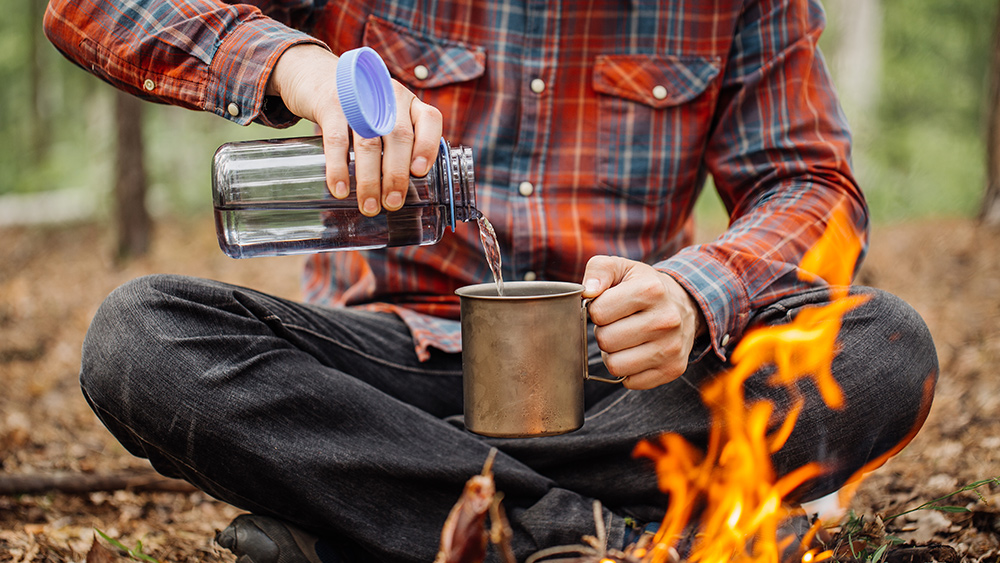
Part of your pantry should be dedicated to "survival" beverages. Here are recommendations of what you can stockpile for long-term survival.
Water
To stay hydrated and maintain oral and personal hygiene during emergencies, water is the first survival beverage that comes to mind. Determine basic water needs by listing each household member's daily water requirement (including pets) – to stay hydrated and do oral and personal hygiene.
Add supplemental water requirements to cook food, wash clothes and other personal items, clean the home, water the garden plants and so on.
Learn about the best emergency water storage containers for your home, even if you are space-constrained, and how best to store this essential resource. (Related: Prepper storage guides: Which containers you should use to store water for stockpiling.)
Other emergency water options for your everyday carry (EDC), go-bags and vehicle are the following:
- Boxed water, which you can buy packaged in 12-pack, 24-pack and 32-pack sizes, comes in recyclable packaging.
- Canned water, although pricey, has a 50-year shelf life. Packed in cans made of corrosion-resistant aluminum and designed to withstand conditions between 38 and 140 degrees Fahrenheit, canned water is ideal for keeping in your vehicle and repurposing.
- Bagged water, which is also expensive, comes in convenient package sizes, doesn't degrade or leak, is easy to store, has a long shelf life and withstands extreme temperatures.
Coffee
This beverage is a much-loved drink – with so many types and methods for brewing it that even the most seasoned coffee experts would have trouble listing them all. Studies have shown that this ancient beverage is more "friend" than "foe." (Related: Enjoy that cup of Joe: Here are science-backed health benefits of CAFFEINE.")
When used responsibly, four representative groups of its micronutrients – caffeine, chlorogenic acid, diterpenes and trigonelline – provide many benefits to your brain, body and general well-being. These chemical compounds have been found to possess biological activities, including anti-microbial, anti-proliferative and antioxidant effects.
Scientifically proven benefits aside, coffee can be considered an "essential survival beverage" and serve as a "vital ally in survival situations."
To retain the best quality in both whole bean and ground coffee, you may need to repackage your beans. Only use (and invest in) canisters with an airtight seal, specifically designed for coffee storage. Store your coffee stock in a cool, dark place away from heat, light and moisture.
Tea
Tea is part of many traditions from all over the world with its endless variations and flavors. Having been practiced for over 2,000 years, drinking tea has been regarded as a "health-promoting habit."
There are two major types of teas you can stock in your pantry. "True tea" is made from the leaves of the plant Camellia sinensis – black tea, green tea, oolong tea, pu-erh tea, white tea and yellow tea. (Related: 6 Primary types of tea and their science-backed health benefits.)
And there are herbal teas, also known as "tisanes," which are made using a combination of bark, flowers, leaves and spices of non-tea plants. (Related: Why people love tea: A look at some herbal tea recipes for mild depression.)
A review published in the Journal of Food Chemistry linked the promising health benefits of tea to its different phenolic components – mainly catechins, flavonoids and tannins. (Related: 8 Tips to help you manage anxiety naturally plus herbal tea recipes for anxiety relief.)
Tea polyphenol catechins, especially in green tea, are believed to exert protective effects against conditions and diseases, such as arteriosclerosis, cancer, diabetes, neurodegenerative diseases, obesity and even tooth decay. These tea components have also exhibited antibacterial, anti-viral and hepatoprotective properties.
Phenolic flavonoids are in particularly high concentrations in tea and its habitual intake has been associated with a reduced risk of cardiovascular disease.
Organic coconut water
Dubbed by the Hawaiians as the "dew from the heavens," fresh coconut water is a naturally sweet and hydrating drink from young, green or "tender coconuts" – fat-free, low-calorie (compared to mature coconuts), rich in nutrients like amino acids, glucose, essential electrolytes (calcium, magnesium, potassium, sodium) and vitamins.
Also referred to as nature's "water of life," its nutrient benefits rapidly deteriorate once exposed to air and warm temperatures. The good news is that fresh coconut water can be freeze-dried into coconut water powder to lock in its powerful nutrients, which support healthy immune function, metabolism and proper hydration.
Coconut water powder has a longer shelf life and can be kept for three years from manufacture when properly stored in an odor-free area at 60-80 Fahrenheit and less than 70 percent humidity. Your product will absorb moisture if left open and exposed to air so keep it in air-tight containers. If you want to keep it in the freezer, pack it in quality freezer bags.
Non-dairy milk, such as organic coconut milk
As the coconut matures, which takes around 10-12 months, some of the coconut water remains while the rest ripens into the solid white flesh known as coconut meat, which is gathered, grated and pressed to create or extract coconut milk.
Coconut milk has an impressive nutritional profile. Studies indicate coconut milk is a rich source of electrolytes (calcium, copper, magnesium, manganese and potassium), iron, protein and healthy fats – particularly medium-chain triglycerides (MCTs), which have been shown to enhance exercise endurance, maintain healthy fluid balance and support overall health. There is a lot of research into the powerful science-backed health benefits of coconut milk.
For long-term storage with no major loss of nutrients, raw coconut milk can be spray-dried or dehydrated using heat to powder form. Consider buying certified USDA organic coconut milk powder, non-GMO, gluten-free, dairy-free, glyphosate-tested, laboratory-verified and only lightly sweetened with organic rice maltodextrin, it contains no additives or preservatives.
For longer shelf life and to keep your product as a ready-to-use fine powder, store it in a cool, dry area with temperatures of 78-86 Fahrenheit.
Organic coconut milk powder is a great choice for anyone seeking a reliable source of plant-based nutrients. Perfect as a gluten-free and dairy-free vegan creamer for your morning coffee, organic coconut milk powder dissolves quickly when stirred in hot water. It may soon become your favorite ingredient for your curries, smoothies, soups and more.
Alcohol
Alcohol can be used as a valuable bartering item. It can help alleviate stress in the middle of disaster (when consumed moderately), and it has many survival uses. It can be used to boost morale, clean a gun, cook an egg, disinfect, eliminate fungus, fuel a lamp and stove, kill mold and weeds, reduce anxiety, repel bugs, soothe mouth pain, start a fire, suppress cough, treat a cold and more.
During your prepping journey, it’s really up to you and your family to determine whether these should be incorporated into your stockpile (and the appropriate quantities to store), as well as any other beverages to consider stockpiling.
Learn about the best time to drink coffee by watching the following video.
Video Brighteon
This video is from the Conservative Coffee Lovers channel on Brighteon.com.
More related stories:
4 Tips to prevent emergency water from freezing.
6 Scientifically proven benefits of green tea.
STUDY: Green tea, black tea and matcha tea found to suppress dioxin toxicity.
Sources include:
EZPrepping.com
NCBI.NLM.NIH.gov 1
PreppersWill.com
NCAUSA.org
PubMed.NCNI.NLM.NIH.gov
DovePress.com
SagePub.com
TLCoconut.com
NCBI.NLM.NIH.gov 2
ZNaturalFoods.com
Chimie-Biologie.UBM.ro
UrbanSurvivalSite.com
Brighteon.com
Survival beverages that are a must for your pantry – NaturalNews.com
If you're gonna fight, fight like you're the third monkey on the ramp to Noah's Ark... and brother its starting to rain. Join our efforts to Secure America's Borders and End Illegal Immigration by Joining ALIPAC's E-Mail Alerts network (CLICK HERE)


 210Likes
210Likes LinkBack URL
LinkBack URL About LinkBacks
About LinkBacks




 Reply With Quote
Reply With Quote


Treasonous Congress Funds Billions For Middle East Invasion...
05-02-2024, 01:28 AM in Videos about Illegal Immigration, refugee programs, globalism, & socialism